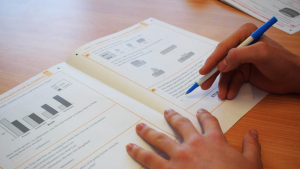Home » Commentary » Opinion » Australia has a real problem with our educational standards
· Daily Telegraph

 Disappointed but not surprised. That’s how sensible people will react to today’s report confirming there hasn’t been a consistent nationwide improvement in NAPLAN results since the tests began in 2008.
Disappointed but not surprised. That’s how sensible people will react to today’s report confirming there hasn’t been a consistent nationwide improvement in NAPLAN results since the tests began in 2008.
To be fair, it’s not entirely doom and gloom. There have been some improvements in Years 3 and 5 average achievement. And overall, students from non-English language backgrounds tend to perform better than the national average — indicating the great contribution many migrant families make by bringing a culture of high expectations to this country.
But the fact that one in five Australian school students are below the international benchmarks for reading, maths and science proves we still have a real problem and our standards are set too low.
And this is despite massive recent increases in school funding, for both government and non-government schools.
Something is not going right.
If you’re wondering about the major causes of Australia’s education woes, look no further than the many prospective new teachers who don’t have basic literacy and numeracy skills themselves, as reported in The Daily Telegraph yesterday.
So it’s hardly an earth-shattering revelation that student literacy and numeracy skills haven’t improved much if teachers themselves are also struggling with those skills.
At the moment, we have a negative cycle where many students leave school without adequate literacy and numeracy skills, get into teaching degrees with low ATARs, and then do a sub-par job of teaching literacy and numeracy to the next cohorts of schoolkids.
Teacher education students need to pass a basic literacy and numeracy test at university before they can graduate as new teachers.
But one in 10 prospective new teachers fail this test on the first sitting (although they are allowed two further attempts, so it’s not exactly HSC-level stressful).
It’s not the fault of these education students.
It’s genuinely unfair of universities to admit them into teaching degrees without first ensuring they have the necessary prerequisite skills to complete the program.
It would be far more sensible if passing the test was a condition of entry into teacher education degrees.
It should be a no-brainer that if students leave school without core literacy and numeracy skills then they shouldn’t be admitted into teacher education degrees in the first place — let alone actually be given the vital task of teaching kids how to read, write, and do maths.
But unfortunately no-brainers are habitually controversial in education policy.
Needless to say, it isn’t just basic literacy and numeracy skills we should expect from teachers — that would be setting an embarrassingly low bar. They should have the capacity to think, read, speak and write at high academic standards.
And we should also expect them — especially secondary school teachers — to have a deep knowledge of their specialist subject.
However, it’s not just a question of improving the quality of the new teacher intake, but also the quality of teacher training.
Teacher education degrees are often too focused on non-essential content — like politics of education, sociology, and “critical studies” (whatever that is) — and not enough on learning how to actually teach.
Knowledge of “social power structures” may be fascinating, but it’s not particularly helpful for new teachers trying to teach English to group of rowdy Year 8s after lunch.
Essential teaching skills like classroom management and evidence-based literacy instruction like phonics are often neglected at university — which raises the question, what exactly is the point of the expensive teacher training?
The reason all of this matters is that teaching quality is the biggest in-school factor affecting student performance.
And it’s especially important for raising the achievement of disadvantaged students.
This issue has flown under the radar to an extent due to the epic debates about school funding in recent years.
But now our focus must shift from increasing school funding — which hasn’t improved results — to improving teacher quality. We need to urgently restore confidence in Australia’s teacher education.
And of course, this means ignoring the dismissals of Australia’s poor results. We often hear that the solution to our disappointing test results is to stop testing — as logically absurd as blaming the thermometer for the hot day.
Schools teach literacy and numeracy anyway (NAPLAN doesn’t force them to teach anything they wouldn’t already be covering), and parents have a right to know how their child and school are going compared to an objective national benchmark.
It’s true that NAPLAN can be significantly improved; and in particular, the minimum standards of the tests should be set much higher than they currently are.
But it’s vital that we keep NAPLAN to ensure transparency of school results and that the education system is held accountable.
Taxpayers should keep asking: are these disappointing outcomes really all we get for $60 billion of school funding a year?
Australia has a real problem with our educational standards